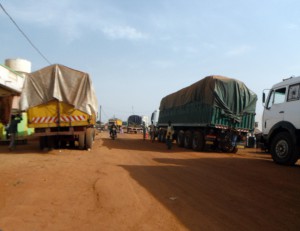In Kidira, a town on Senegal’s eastern edge, the border policeman sees me studying the big trucks lined up on the road for the half mile back into town. I am standing—Senegal behind me to the west, and Mali before me to the east—in front of the metal card table where he presides on the veranda of the border checkpoint, a concrete shack with a corrugated iron roof. Waiting nearby, engine running, is a tiny Renault taxi I’ve hired to take me into Mali. Maybe he has noticed the fixed stare on my face as I turn my head this way and that. While writing my passport number in a large spiral bound register, the policeman shouts, “Do you know why there are so many trucks here?” in a voice that does not expect an answer. “Mali has no seacoast and no seaport,” he says, fanning the pages in search of a spot to stamp Senegal’s permission for me to leave the country.
On dirt streets off the main road, harsh, boxy long-haul trucks muscle everything else aside and out of sight, dwarfing mud homes and the police and customs shacks like an invasion of giant centipedes. Motor scooters and the occasional car dart around them. The skyline is all trucks. They roll on the asphalt road and wobble and jerk across rutted streets, some listing dangerously as they try to maneuver off or back up on the asphalt. This is a world of dust, diesel, and engines so loud that nearly everyone speaks at a half shout or greater.
Finally, the policeman opens my passport on the table, fingers splayed across the pages. He wears black trousers and an immaculate khaki tunic with black epaulettes, his bare feet resting atop brown leather slippers. He looks at me, his shaven head lowered, eyes raised as if over glasses tipped on the end of his nose, though the glasses are missing.
The taxi driver took a network of side streets to get me to the border and the front of the line. From here the trucks thread west back through Kidira and out of town for two miles on both sides of the asphalt, leaving a narrow path between for everyone else. Only a few trucks are going west into Senegal from Mali, carrying onions, millet and sorghum, peanuts, and Mali’s main export, livestock. Most are going east, into Mali, full of condensed milk, water pumps, gasoline and diesel fuel, electric generators, bulldozers, cement mix, bottled water, Coke and Fanta, medical supplies, and hundreds of other items offloaded from ships at the port at Dakar and that keep landlocked Africa going. This includes, according to customs and police, weapons for the Muslim fundamentalists of Al Qaeda in the Islamic Maghreb and the separatist Tuareg rebels fighting both Mali and Niger for their own piece of desert. More likely arms and drugs move through the bush, which is unmarked and mostly unpatrolled between major roads. This is a border like most in French West Africa: The precise path no one has verified, not even the French colonizers who drew the line.
The policeman says, “Le Mali, c’est un pays enclave—Mali is a closed-in country.” He raises his hands and his eyebrows as he touches his thumbs and index fingers to make an oval, sealed off. “Do you see?”
I wonder if he has a special need to be sure I don’t fly away from Africa without knowing one of its many injustices—that a country could be locked inside a continent.
“Right,” I say, careful about expressing too much to the man holding my passport. “Not good.”
He smiles and hands back my passport. “No, it’s not good. Bonne Route, monsieur.”
